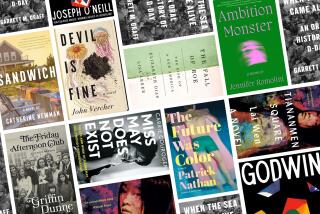Bookslut launches the Daphne award: What’s the best book of 1963?
- Share via
In an effort to correct the missteps of literary history, Bookslut has launched the Daphne, a prize for the best book published 50 years ago. Sure, there was a National Book Award in 1963 -- but Bookslut thinks it went to the wrong title.
“Book awards, for the most part, celebrate mediocrity. It takes decades for the reader to catch up to a genius book, it takes years away from hype, publicity teams, and favoritism to see that some books just aren’t that good,” editor Jessa Crispin wrote on the site’s blog Monday.
Although politics and the bright light of fame do play a role, another factor is simply art. It’s not always easy to see the new standard in the outlier, to recognize innovation over excellence in a known format.
Famously, “Citizen Kane,” considered by many film historians to be the greatest movie ever made, didn’t win the best picture Oscar. Instead, it went to “How Green Was My Valley,” a far less enduring picture (and that’s putting it nicely).
What did win the big literary prizes of 1963? Interestingly, that was the sixth time in its then-46 years that there was no Pulitzer Prize for fiction. The Pulitzer committee, apparently, was not impressed.
The National Book Award (presented in 1964) went to “The Centuar” by John Updike -- a book that Crispin dismisses with a disparaging “ugh.” Runners-up were “Idiots First” by Bernard Malamud, “The Group” by Mary McCarthy, “V” by Thomas Pynchon and “The Will” by Harvey Swados.
If you’re thinking “Harvey who?,” you’re not alone.
Pynchon’s “V” is one of the books Bookslut has on its list of Daphne contenders. For the awards, it’s considering fiction, nonfiction, poetry and children’s books.
A starter list of contenders is posted on its site and repeated below. It’s throwing open the Daphne nominations to any interested parties, with explanations of how to nominate here.
Fiction
“Hopscotch” by Julio Cortazar
“Girls of Slender Means” by Muriel Spark
“The Bell Jar” by Sylvia Plath
“Cat’s Cradle” by Kurt Vonnegut
“The Man Who Fell to Earth” by Walter Tevis
“V” by Thomas Pynchon
Nonfiction
“Memories, Dreams, Reflections” by Carl Jung
“The Words” by Jean Paul Sartre
“Fire Next Time” by James Baldwin
“Anti-Intellectualism in American Life” by Richard Hofstadter
“American Way of Death” by Jessica Mitford
“Six Easy Pieces” by Richard P. Feynman
“Destruction of Dresden” by David Irving
“Eichmann in Jerusalem” by Hannah Arendt
Poetry
“Flight to Africa” by Austin Clarke
“Burning Perch” by Louis MacNeice
“Reality Sandwiches” by Allen Ginsberg
“73 Poems” by e e cummings
“Snapshots of a Daughter-in-Law” by Adrienne Rich
“All My Pretty Ones” by Anne Sexton
“Requiem” by Anna Akhmatova
Kids Books
“Gashlycrumb Tinies” by Edward Gorey
“The Dot and the Line” by Norton Juster
“Where the Wild Things Are” by Maurice Sendak
“Mr Rabbit” by Charlotte Zolotow
People suffering from Franzenfreude may be pleased to learn that an alternate designation of the Daphne among Bookslut editors is “The Corrections” -- both for the award’s intent and for the 2001 National Book Award-winning novel by Jonathan Franzen.
ALSO:
The last word on the Holocaust?
Jesse Ball’s slippery ‘Silence Once Begun’ built on false confession
Kate DiCamillo wins Newbery Medal; Prinz, Caldecott awards announced
Carolyn Kellogg: Join me on Twitter, Facebook and Google+
More to Read
Sign up for our Book Club newsletter
Get the latest news, events and more from the Los Angeles Times Book Club, and help us get L.A. reading and talking.
You may occasionally receive promotional content from the Los Angeles Times.








